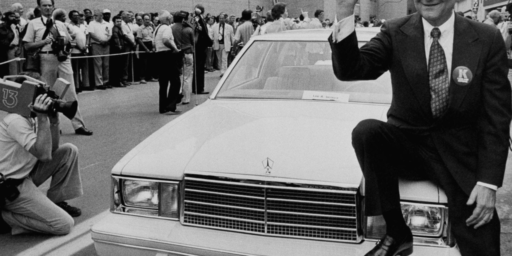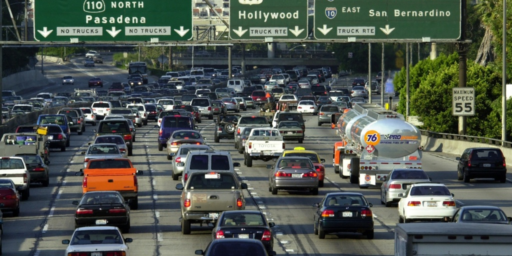UAW Strikes Widen as Biden Signals Support
The President and his predecessor are heading to Detroit.

NPR (“UAW significantly ramps up strikes against GM and Stellantis — but not Ford“):
The United Auto Workers union will expand its strike against two of the Big Three automakers, ramping up pressure on the companies to reach deals on new contracts — with President Biden set to join the historic strike in an extraordinary move of support.
UAW workers at 38 GM and Stellantis parts distributions centers, spread across 20 states, walked off the job at 12 p.m. ET on Friday after UAW President Shawn Fain said the two companies had failed to budge on key issues in ongoing talks for a new contract.
Fain said the union would not expand its strike against Ford, citing progress on its talks with the automaker, although an existing strike at a plant in Wayne, Mich., would continue.
[…]
Fain also invited President Biden to join workers on the picket line — and Biden later confirmed he would travel to Michigan next week.
“Tuesday, I’ll go to Michigan to join the picket line and stand in solidarity with the men and women of UAW as they fight for a fair share of the value they helped create,” Biden tweeted on X, formerly known as Twitter.
“It’s time for a win-win agreement that keeps American auto manufacturing thriving with well-paid UAW jobs.”
Former President Donald Trump – the front-runner in the GOP primary race — has also said he plans to go to Detroit next week.
Roughly 5,600 workers at GM and Stellantis distribution centers across the country will join the approximately 13,000 employees at three Midwest auto plants who were the first to walk off the job last week, when the union’s contracts with the automakers expired.
This latest expansion will strategically hit GM and Stellantis facilities that supply car parts to dealerships. It also spotlights the two-tier wage system that the UAW is fighting to eliminate, as some workers at these parts distrubution centers have a lower maximum pay rate than workers elsewhere.
Fain’s so-called “stand up” strike strategy is intended to keep Ford, General Motors and Stellantis on their toes with sudden, targeted strikes at strategic locations, rather than having all of the nearly 150,000 UAW auto workers walk off their jobs at once.
This, naturally, raises the question of why the automakers don’t simply lock out the UAW-organized workers everywhere rather than allowing the union to do selective damage. They have, but only sporadically:
The automakers have responded with temporary layoffs, blaming the supply disruptions caused by the strikes.
General Motors has temporarily laid off most of the approximately 2,000 unionized workers at its Fairfax assembly plant in Kansas as a result of the ongoing UAW strikes. The other two companies have also announced temporary layoffs at a smaller scale.
So far, the companies have failed to present wage offers that the union sees as adequate, though the automakers say they’ve put generous offers on the table.
POLITICO (“Biden to join the picket line in UAW strike“) expands on the President’s gesture:
His decision to stand alongside the striking workers represents perhaps the most significant display of union solidarity ever by a sitting president. Biden’s announcement comes a week after he expressed solidarity with the UAW and said he “understand[s] the workers’ frustration.”
The announcement of his trip was seen as a seismic moment within certain segments of the labor community. “Pretty hard-core,” said one union adviser, who spoke anonymously because they were not authorized to speak publicly.
Biden had earlier attempted to send acting Labor Secretary Julie Su and senior adviser Gene Sperling, who has been the White House’s point person throughout the negotiations, to Detroit to assist with negotiations. However, the administration subsequently stood down following conversations with the union. Press secretary Karine Jean-Pierre said earlier Friday it was a “mutually agreed upon decision.”
The president’s plans come as some Democrats have begun to question his response to the strike, recognizing that he needs the full backing of union workers in his presidential reelection bid.
As for Trump:
Former President Donald Trump also has plans to visit Michigan next week. Despite backlash from Fain, the leading candidate in the Republican presidential primary will visit current and former workers next Wednesday — the same day his competitors in the field take the debate stage in California. A person familiar with Trump’s plans said that he is “unlikely to go to the picket line” but that such a stop “has not been ruled in or out.”
Jason Miller, a spokesperson for Trump, criticized Biden’s decision to go to Detroit in his own post on X.
“The only reason Biden is going to Michigan on Tuesday is because President Trump announced he is going on Wednesday,” Miller wrote.
One suspects UAW workers already have a pretty strong preference between Biden and Trump that’s unlikely to change based on these photo ops. Given that car prices are already radically higher than they were when he took office, I’m a bit surprised that Biden is doubling down in his active support for the union. There are far more voters who will be angry that they’re having to pay yet more—both because of the short-term supply issues and longer-term pass-alongs once a settlement is reached—than there are auto workers who will benefit.
The UAW demands seem absurd in the face of the larger economy, especially since the Big Three have to compete not only against foreign imports but non-union American workers in so-called right to work states. But the manufacturers have done a horrendously poor job of messaging. We know what the UAW is demanding but have no idea what the counter-offers are. Given that the strikers are already earning considerably more than comparably-skilled workers elsewhere in the economy, that seems unwise.






Bullshit. As the pay gap between C Suite salaries and regular employees continues to grow, labor is saying “Enough!”. Film and TV writers, Actors, Hotel Workers, and Medical workers are currently on strike in addition to the UAW. Next week will probably bring strikes from the Kaiser Permanente unions(75K in six states), along with SEIU 721 (11K) and the Association of Flight Attendants (26K).
The CEO of GM made 30 million dollars last year. The GM Stock price is almost $3 lower today than it was one year ago today. The stock is down over a dollar over the last five years. She made $30M. Why? I get that running a huge business is very difficult. But my guess is you should have to show performance to earn that kind of money. Writers are on strike because the companies like WB Discovery claim poverty, yet can pay Zazlav $240M for one year, while the company is “losing money. ” Bullshit.
The minimum wage hasn’t changed in some states (GA, looking at you) since 2009. 7.25 per hour. WTF? Who can live on that? Interestingly enough the Federal minimum wage was updated and increased pretty regularly until 2009. Then it just stopped.
I’m glad labor finally is becoming a force again. But until the pay CEO pay gets back in line, we are going to have alot more strikes. And we should.
At the moment, it is a no lose proposition for Biden.
https://www.ipsos.com/en-us/reutersipsos-poll-most-americans-support-autoworkers-strike
@EddieInCA: I agree that CEO pay is out of line with both performance and wages. But if the CEOs of the Big 3 took $1 a year in salary, it would have essentially zero effect on the ability to pay 150,000 UAW workers. Yes, $30 million is an absurd salary. But if you divided it among 50,000 workers, that’s $600 a year.
Auto workers agreed to huge cuts back in 2008 to save the big three from going under in the economic catastrophe caused by the banks. Since then the companies have not only recovered but have been making enormous profits — and, sorry JJ — been able to pay their top executives tens of millions of dollars.
There is money out there, and the companies have decided that the only people it should go to are executives and shareholders. The workers have another suggestion. Which JJ finds absurd.
@EddieInCA: Impossible to upvote this enough.
There are so many mistaken framing assumptions built into this statement that I don’t know where to begin. How, exactly, does “the larger economy” change the reality of getting paid $15/hour to do skilled work for a company that declared hundreds of billions of dollars of profit last year, and whose executives are paid like Tom Cruise?
You’re essentially saying that it is perfectly reasonable for the workers who can least afford it to subsidize those who can most afford it, and to not participate in any of the corporate success that depends on their work. You do know how that ends, right?
@James Joyner:
Thanks for the response, Dr. Joyner. But the issue isn’t just the CEO. It’s executive compensation as a whole.
At GM alone:
Mary Barra – CEO – $29.97M
Mark Ruess – Pres – $14.45M
P. Jacobson – CFO – $10,25M
S. Carlisle – EVP – $8.88M
D. Parks – EVP – $8.79M
Having this bloated a C-Suite is obscene when your company is, basically, treading water in the stock price year over. year.
It’s not right. And it’s prevalent.
@DrDaveT:
Nope. Let’s not get carried away. Tom Cruise made over $100M in 2022 alone, But it was all based on profit participation on “Top Gun Maverick. ” If they were making Tom Cruise money, I’d be out with pitchforks.
@wr:
To add to WR’s point…
General Motors gross profit for the twelve months ending June 30, 2023 was $22.344B, a 32.21% increase year-over-year. General Motors annual gross profit for 2022 was $20.981B, a 17.36% increase from 2021. General Motors annual gross profit for 2021 was $17.878B, a 30.76% increase from 2020.
Last year, GM announced it was planning to buyback 5 billion of stock. This is a no-brainer for Biden. People are extremely tired of being told that the actual workers are the least important cog in the machine of C-level execs and the wealthy who have almost all of the capital in this country. If you can spend 5 billion for the sole purpose of keeping stock prices up you can spend that 5 billion or more on raises.
The Big 3, especially Stelantis, cars aren’t selling. Here’s the slowest and fastest selling cars as of this month. The US mfrs have more than a year inventory on some models. Often those slow movers have hefty price tags.
So UAW union strike, especially if at plants producing the non-selling models, is good and likely helps the companies with supplier contracts.
Or the UAW can go hard on the companies and push Old Joe to have to go hat in hand to Elon Musk if he wants EVs for everyone anytime soon.
@James Joyner: @EddieInCA:
A good portion of that compensation is in equity, no? That’s not a small point. It cuts against one of Eddie’s points in that it does tie the value of executive compensation to performance.
But it raises another point. People of certain ideologies like to talk about having skin in the game, especially when it involves government transfers to anyone not deemed worthy of a dignified life. How do you think management at the big 3 would react if the union applied that concept to the workers?
That’s the key point–employers expect workers to take ownership in the sense of responsibility to the company, but the workers cannot expect equity in return. Rather than incentivize productivity via distribution of stake, it’s done via coercion. Lose your job; lose your roof.
All you need to know about the current toxicity of the well after a century plus of concentrated bile consisting of half-truths and outright lies aimed at Americans can be found during CBA negotiations between NFL owners and players. Not a single person would be interested in watching Robert Kraft, Arthur Blank, and Jerry Jones line up to play football against each other, yet a good chunk of fans think the players who put their brains and bones on the line are the entitled, spoiled ones.*
(Though I admit my darker side is interested in seeing Jerry Jones run a shallow crosser against the Niners just to see Fred Warner say hello to that hemorrhoid.)
*I suspect a lot of them think being on an NFL team is like playing in high school–lift weights then practice for a few hours in the afternoon/evening and play a game once a week.
@EddieInCA:
Indeed. I see pundits saying the CEO salaries, if divvied up among the workers would only be a few hundred dollars. ($500 if my envelope back is working.) But of course a) it’s not just the CEOs, it’s the whole C suite and a layer or three below them, and b) that’s not really the point.
The union made big concessions to carry the manufacturers through the 2008 W. Bush recession. There were at least implied promises they’d be made whole later. And if the Big Three were serious about keeping down labor costs compared to other countries, they’d be lobbying to off load health care costs to a federal single payer system.
@ James
So because red states have created anti-worker, pro-billionaire business environments, blue states should follow them?
The GOP game is aristocrats and serfs. Always has been…
@EddieInCA: When I see the massive profits being used to say that the company can pay workers more, I generally agree, but it brings up the obvious question:
If the company were earning less, would the workers deserve to make less? They’re doing the same (very-skilled) job, assembling the rejiggerator on the flurbenthocker or whatever, at the same level of productivity.
The actions of the assembly employee have basically no bearing on whether the company is successful, once a certain quality of work is reached. The success of the company is usually in the hands of the people deciding what work should be done (product managers) and the people who market that product.
This ties into @Kurtz’s comment about compensation in stock. There have been a few companies I have worked for where I would desperately not want to be paid in stock because management were taking huge risks that were almost certainly not going to pay off (and they didn’t), but I got a predictable amount of money (until the company folded).
I don’t have a clear point, just that using the yearly profits to justify raising wages is a double edged sword, because it will be used to justify cutting wages next year. And for a lot of people, a stable 80% $N/yr is better than a very variable income “targeted” at $N/yr.
@Gustopher:
You might want to reconsider the logic there. If you are going to assume good quality, your argument is circular. Achieving “a certain quality of work” is not independent of how you treat your workers, and never has been. (I doubt that active sabotage by line workers at GM is the problem that it used to be; I’d hope to keep it that way.)
@Gustopher:
It would be interesting to ask the employees, through their union, whether they would be interested in getting part of their compensation in the form of ownership shares. The answer might be informative in multiple ways.
@DrDaveT: yup. Back in the 70s, worker morale was so low, cans and sandwiches were put between the door panel and the door to act as a hard to find rattle or a biological time bomb.
@Kurtz:
@DrDaveT:
@Gustopher:
I’m old enough to remember yearly bonuses. Growing up, in the 60’s/70’s, pretty much every single person who had a normal job (outside of government) looked forward to their annual bonus. This bonus was directly related to the success of the company. Each employee would get a bonus if the company did well. Years the company didn’t do so well, no bonuses.
Hell, in my very first job for Footlocker in 1978, I earned less than $250/wk, but I got a bonus end of the year that was almost $1000. Almost every single private company gave bonuses. That went away during the 80’s decade of greed, and pretty is now limited to high end partners of equity firms, law firms, and accounting firms.
Why can’t we go back to that sort of system? The reality is the wages haven’t even kept up with inflation. Labor is saying “Enough!”, and it’s about freaking time.
“If the company were earning less, would the workers deserve to make less?”
When that happens they get fired. If things are really bad sometimes the CEO also gets fired, with a golden parachute.
Just some numbers to keep things in perspective. If you include all of the exec team and give them salaries of $2million, everyone else gets a $1000 raise. Not a lot, not nothing. Pay is $33/hour so that’s about 1.5% raise. Now, suppose that you take take $3 billion of that $22.3 billion profit and give that to the workers. For those 150,000 workers that is a $20,000 raise or about 30%. Take another billion so that profit was only $18.3 billion and your raise is over 40%.
Steve
Two things that are important to remember: First: Henry Ford and his generation were the automotive entrepreneurs. Mary Barra et al are employees hired to run what they built. Second: the actual investors who paid money to Ford/GM/Chrysler in return for stock are dead an buried. Today’s owners invested in a stock, not a company. When the stock price rises it makes no difference to the operations of the companies, only to the current shareholders.
Given that, the way the system works is that the significant shareholders hire as employees C level executives that will maximize share price, which directly benefits the shareholders. Sometimes that is tangentially coupled with what the company does, but not always, as in the case of stock buybacks. Rather than invest in the future, company profits are used to reward investors. I’m not saying that is necessarily a bad thing, but the bottom line is that one group of people with leverage in a company hire another group of people to maximize the first groups return. The shareholders grant the executives leverage in a company, and incentivize them by tying their compensation to the things that benefit the stockholders.
But the workers, when they act collectively, also have leverage in the the company. Explain to me again why workers shouldn’t be able to use that leverage to maximize the return to them, but the other two groups should?
@EddieInCA:
Excellent point.
Reminded me of Gosling looking at his check at the end of The Big Short.